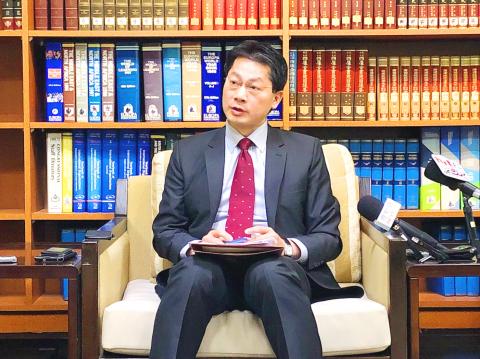Taiwan does not intend to move its representative office in Israel from Tel Aviv, although it acknowledges Jerusalem as the capital, the Ministry of Foreign Affairs (MOFA) said yesterday.
The ministry is keeping a close watch on developments in the wake of US President Donald Trump’s announcement on Wednesday that the US now formally recognizes Jerusalem as the capital of Israel and plans to relocate its embassy there, ministry spokesman Andrew Lee (李憲章) told a regular media briefing.
The ministry’s Web site lists Jerusalem as the Israeli capital, he said

Photo: Lu Yi-hsuan, Taipei Times
“We acknowledge Jerusalem as Israel’s capital,” he said. “However, at present, we are not considering moving Taiwan’s representative office from Tel Aviv to Jerusalem.”
Meanwhile, the ministry is calling on Israel and the Palestinian territories to settle their conflict by peaceful means and seek a mutually acceptable peace proposal that would serve the best interests of their people, Lee said.
The Palestinian National Authority has declared “three days of rage,” from Wednesday until today, during which protests are expected to be held in Jerusalem and the Palestinian territories, Lee said, adding that Taiwanese traveling or doing business there are advised to avoid crowded places.
The ministry has instructed the Taipei Economic and Cultural Office in Tel Aviv and other offices to issue advisories to nationals abroad to raise awareness of the situation, Lee said.

A preclearance service to facilitate entry for people traveling to select airports in Japan would be available from Thursday next week to Feb. 25 at Taiwan Taoyuan International Airport, Taoyuan International Airport Corp (TIAC) said on Tuesday. The service was first made available to Taiwanese travelers throughout the winter vacation of 2024 and during the Lunar New Year holiday. In addition to flights to the Japanese cities of Hakodate, Asahikawa, Akita, Sendai, Niigata, Okayama, Takamatsu, Kumamoto and Kagoshima, the service would be available to travelers to Kobe and Oita. The service can be accessed by passengers of 15 flight routes operated by

Alain Robert, known as the "French Spider-Man," praised Alex Honnold as exceptionally well-prepared after the US climber completed a free solo ascent of Taipei 101 yesterday. Robert said Honnold's ascent of the 508m-tall skyscraper in just more than one-and-a-half hours without using safety ropes or equipment was a remarkable achievement. "This is my life," he said in an interview conducted in French, adding that he liked the feeling of being "on the edge of danger." The 63-year-old Frenchman climbed Taipei 101 using ropes in December 2004, taking about four hours to reach the top. On a one-to-10 scale of difficulty, Robert said Taipei 101

MORE FALL: An investigation into one of Xi’s key cronies, part of a broader ‘anti-corruption’ drive, indicates that he might have a deep distrust in the military, an expert said China’s latest military purge underscores systemic risks in its shift from collective leadership to sole rule under Chinese President Xi Jinping (習近平), and could disrupt its chain of command and military capabilities, a national security official said yesterday. If decisionmaking within the Chinese Communist Party has become “irrational” under one-man rule, the Taiwan Strait and the regional situation must be approached with extreme caution, given unforeseen risks, they added. The anonymous official made the remarks as China’s Central Military Commission Vice Chairman Zhang Youxia (張又俠) and Joint Staff Department Chief of Staff Liu Zhenli (劉振立) were reportedly being investigated for suspected “serious

Taiwanese and US defense groups are collaborating to introduce deployable, semi-autonomous manufacturing systems for drones and components in a boost to the nation’s supply chain resilience. Taiwan’s G-Tech Optroelectronics Corp subsidiary GTOC and the US’ Aerkomm Inc on Friday announced an agreement with fellow US-based Firestorm Lab to adopt the latter’s xCell, a technology featuring 3D printers fitted in 6.1m container units. The systems enable aerial platforms and parts to be produced in high volumes from dispersed nodes capable of rapid redeployment, to minimize the risk of enemy strikes and to meet field requirements, they said. Firestorm chief technology officer Ian Muceus said